The Global Challenge of Climate Change - Essay Assignment
VerifiedAdded on 2023/01/18
|5
|944
|100
Essay
AI Summary
This essay addresses the pressing global challenge of climate change, highlighting its multifaceted impacts on the environment and society. The essay begins by emphasizing the severity of climate change and its effects on natural resources, citing the alarming loss of glaciers across major mountain ranges, which contributes to rising sea levels and threatens coastal populations. It explores the role of the greenhouse effect, increased consumption, and production in driving climate change. The essay also discusses the broader implications of climate change, including disturbed agricultural processes, food insecurity, ecological disruptions, and pollution, all of which threaten sustainability. Finally, the essay examines the complex relationship between globalization and environmental degradation, arguing that while globalization offers benefits, its impact on the planet is a significant concern for present and future generations.
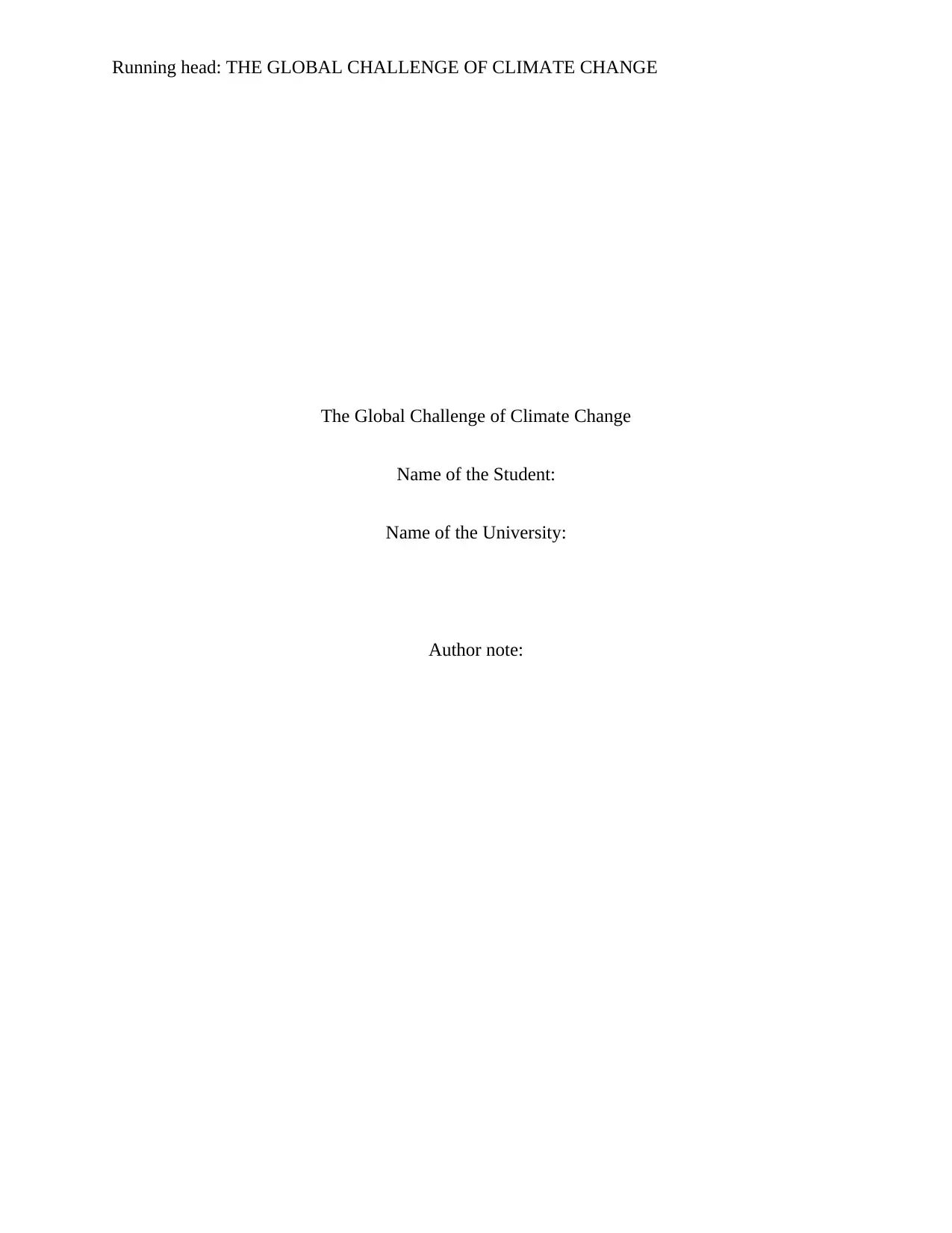
Running head: THE GLOBAL CHALLENGE OF CLIMATE CHANGE
The Global Challenge of Climate Change
Name of the Student:
Name of the University:
Author note:
The Global Challenge of Climate Change
Name of the Student:
Name of the University:
Author note:
Paraphrase This Document
Need a fresh take? Get an instant paraphrase of this document with our AI Paraphraser
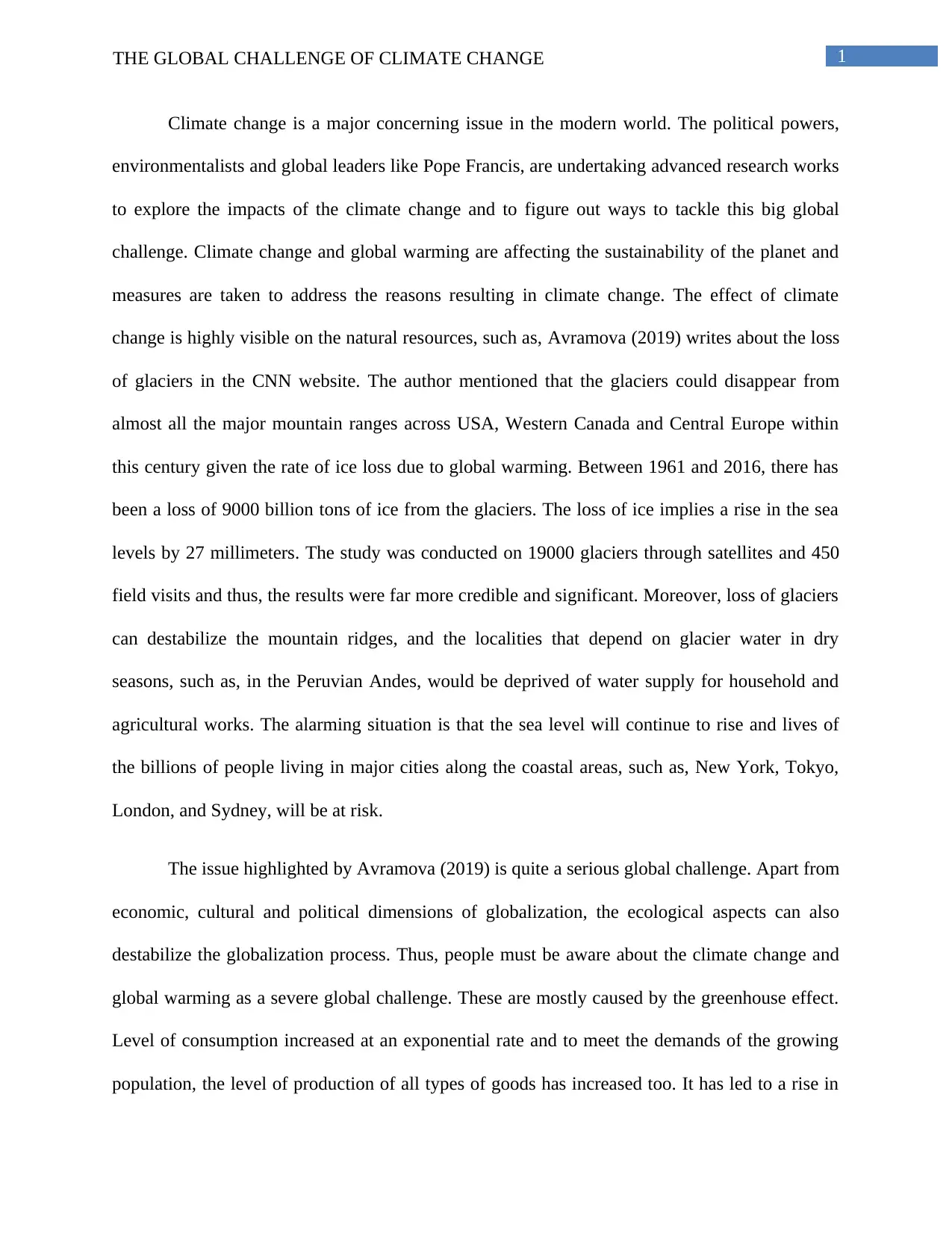
1THE GLOBAL CHALLENGE OF CLIMATE CHANGE
Climate change is a major concerning issue in the modern world. The political powers,
environmentalists and global leaders like Pope Francis, are undertaking advanced research works
to explore the impacts of the climate change and to figure out ways to tackle this big global
challenge. Climate change and global warming are affecting the sustainability of the planet and
measures are taken to address the reasons resulting in climate change. The effect of climate
change is highly visible on the natural resources, such as, Avramova (2019) writes about the loss
of glaciers in the CNN website. The author mentioned that the glaciers could disappear from
almost all the major mountain ranges across USA, Western Canada and Central Europe within
this century given the rate of ice loss due to global warming. Between 1961 and 2016, there has
been a loss of 9000 billion tons of ice from the glaciers. The loss of ice implies a rise in the sea
levels by 27 millimeters. The study was conducted on 19000 glaciers through satellites and 450
field visits and thus, the results were far more credible and significant. Moreover, loss of glaciers
can destabilize the mountain ridges, and the localities that depend on glacier water in dry
seasons, such as, in the Peruvian Andes, would be deprived of water supply for household and
agricultural works. The alarming situation is that the sea level will continue to rise and lives of
the billions of people living in major cities along the coastal areas, such as, New York, Tokyo,
London, and Sydney, will be at risk.
The issue highlighted by Avramova (2019) is quite a serious global challenge. Apart from
economic, cultural and political dimensions of globalization, the ecological aspects can also
destabilize the globalization process. Thus, people must be aware about the climate change and
global warming as a severe global challenge. These are mostly caused by the greenhouse effect.
Level of consumption increased at an exponential rate and to meet the demands of the growing
population, the level of production of all types of goods has increased too. It has led to a rise in
Climate change is a major concerning issue in the modern world. The political powers,
environmentalists and global leaders like Pope Francis, are undertaking advanced research works
to explore the impacts of the climate change and to figure out ways to tackle this big global
challenge. Climate change and global warming are affecting the sustainability of the planet and
measures are taken to address the reasons resulting in climate change. The effect of climate
change is highly visible on the natural resources, such as, Avramova (2019) writes about the loss
of glaciers in the CNN website. The author mentioned that the glaciers could disappear from
almost all the major mountain ranges across USA, Western Canada and Central Europe within
this century given the rate of ice loss due to global warming. Between 1961 and 2016, there has
been a loss of 9000 billion tons of ice from the glaciers. The loss of ice implies a rise in the sea
levels by 27 millimeters. The study was conducted on 19000 glaciers through satellites and 450
field visits and thus, the results were far more credible and significant. Moreover, loss of glaciers
can destabilize the mountain ridges, and the localities that depend on glacier water in dry
seasons, such as, in the Peruvian Andes, would be deprived of water supply for household and
agricultural works. The alarming situation is that the sea level will continue to rise and lives of
the billions of people living in major cities along the coastal areas, such as, New York, Tokyo,
London, and Sydney, will be at risk.
The issue highlighted by Avramova (2019) is quite a serious global challenge. Apart from
economic, cultural and political dimensions of globalization, the ecological aspects can also
destabilize the globalization process. Thus, people must be aware about the climate change and
global warming as a severe global challenge. These are mostly caused by the greenhouse effect.
Level of consumption increased at an exponential rate and to meet the demands of the growing
population, the level of production of all types of goods has increased too. It has led to a rise in
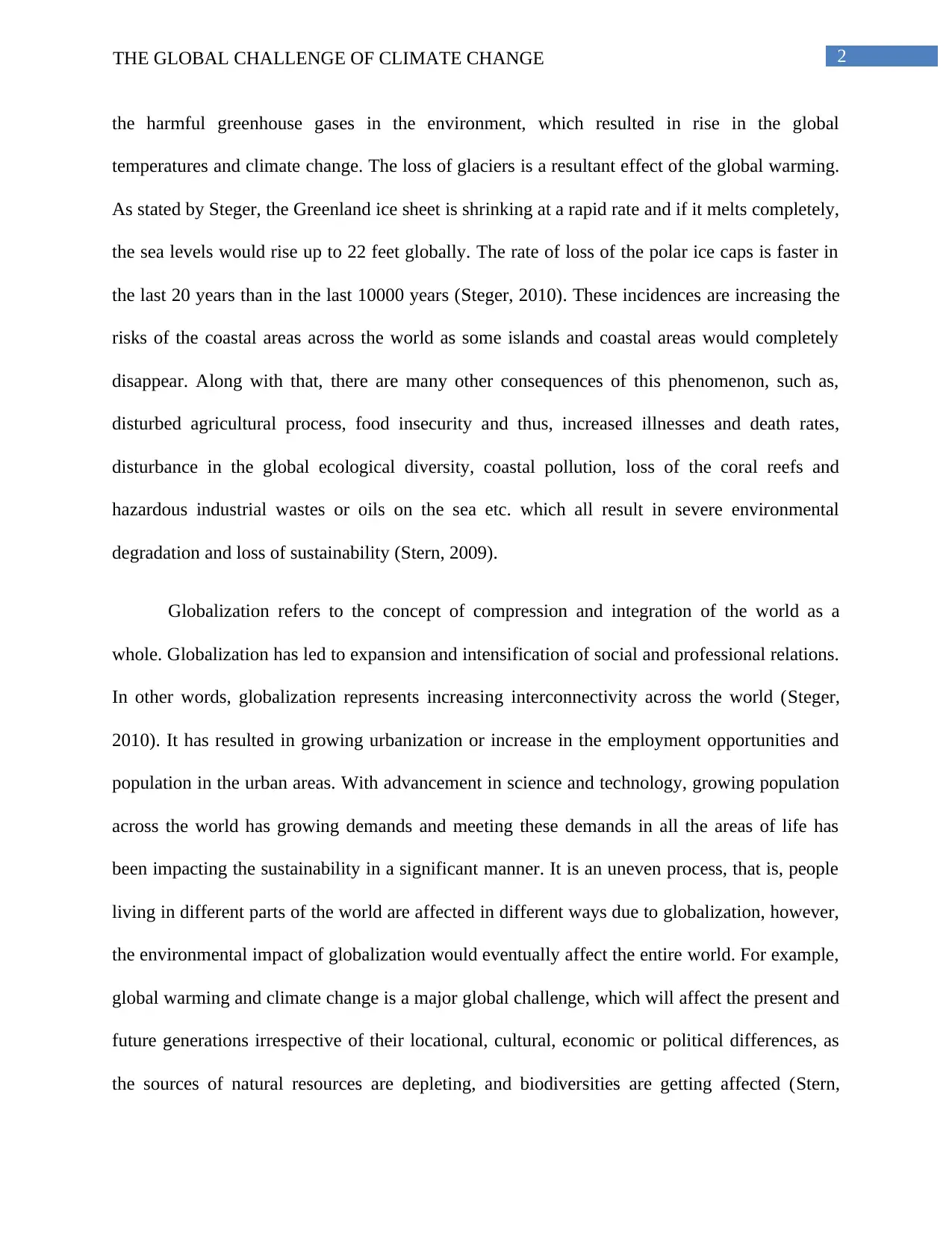
2THE GLOBAL CHALLENGE OF CLIMATE CHANGE
the harmful greenhouse gases in the environment, which resulted in rise in the global
temperatures and climate change. The loss of glaciers is a resultant effect of the global warming.
As stated by Steger, the Greenland ice sheet is shrinking at a rapid rate and if it melts completely,
the sea levels would rise up to 22 feet globally. The rate of loss of the polar ice caps is faster in
the last 20 years than in the last 10000 years (Steger, 2010). These incidences are increasing the
risks of the coastal areas across the world as some islands and coastal areas would completely
disappear. Along with that, there are many other consequences of this phenomenon, such as,
disturbed agricultural process, food insecurity and thus, increased illnesses and death rates,
disturbance in the global ecological diversity, coastal pollution, loss of the coral reefs and
hazardous industrial wastes or oils on the sea etc. which all result in severe environmental
degradation and loss of sustainability (Stern, 2009).
Globalization refers to the concept of compression and integration of the world as a
whole. Globalization has led to expansion and intensification of social and professional relations.
In other words, globalization represents increasing interconnectivity across the world (Steger,
2010). It has resulted in growing urbanization or increase in the employment opportunities and
population in the urban areas. With advancement in science and technology, growing population
across the world has growing demands and meeting these demands in all the areas of life has
been impacting the sustainability in a significant manner. It is an uneven process, that is, people
living in different parts of the world are affected in different ways due to globalization, however,
the environmental impact of globalization would eventually affect the entire world. For example,
global warming and climate change is a major global challenge, which will affect the present and
future generations irrespective of their locational, cultural, economic or political differences, as
the sources of natural resources are depleting, and biodiversities are getting affected (Stern,
the harmful greenhouse gases in the environment, which resulted in rise in the global
temperatures and climate change. The loss of glaciers is a resultant effect of the global warming.
As stated by Steger, the Greenland ice sheet is shrinking at a rapid rate and if it melts completely,
the sea levels would rise up to 22 feet globally. The rate of loss of the polar ice caps is faster in
the last 20 years than in the last 10000 years (Steger, 2010). These incidences are increasing the
risks of the coastal areas across the world as some islands and coastal areas would completely
disappear. Along with that, there are many other consequences of this phenomenon, such as,
disturbed agricultural process, food insecurity and thus, increased illnesses and death rates,
disturbance in the global ecological diversity, coastal pollution, loss of the coral reefs and
hazardous industrial wastes or oils on the sea etc. which all result in severe environmental
degradation and loss of sustainability (Stern, 2009).
Globalization refers to the concept of compression and integration of the world as a
whole. Globalization has led to expansion and intensification of social and professional relations.
In other words, globalization represents increasing interconnectivity across the world (Steger,
2010). It has resulted in growing urbanization or increase in the employment opportunities and
population in the urban areas. With advancement in science and technology, growing population
across the world has growing demands and meeting these demands in all the areas of life has
been impacting the sustainability in a significant manner. It is an uneven process, that is, people
living in different parts of the world are affected in different ways due to globalization, however,
the environmental impact of globalization would eventually affect the entire world. For example,
global warming and climate change is a major global challenge, which will affect the present and
future generations irrespective of their locational, cultural, economic or political differences, as
the sources of natural resources are depleting, and biodiversities are getting affected (Stern,
⊘ This is a preview!⊘
Do you want full access?
Subscribe today to unlock all pages.

Trusted by 1+ million students worldwide
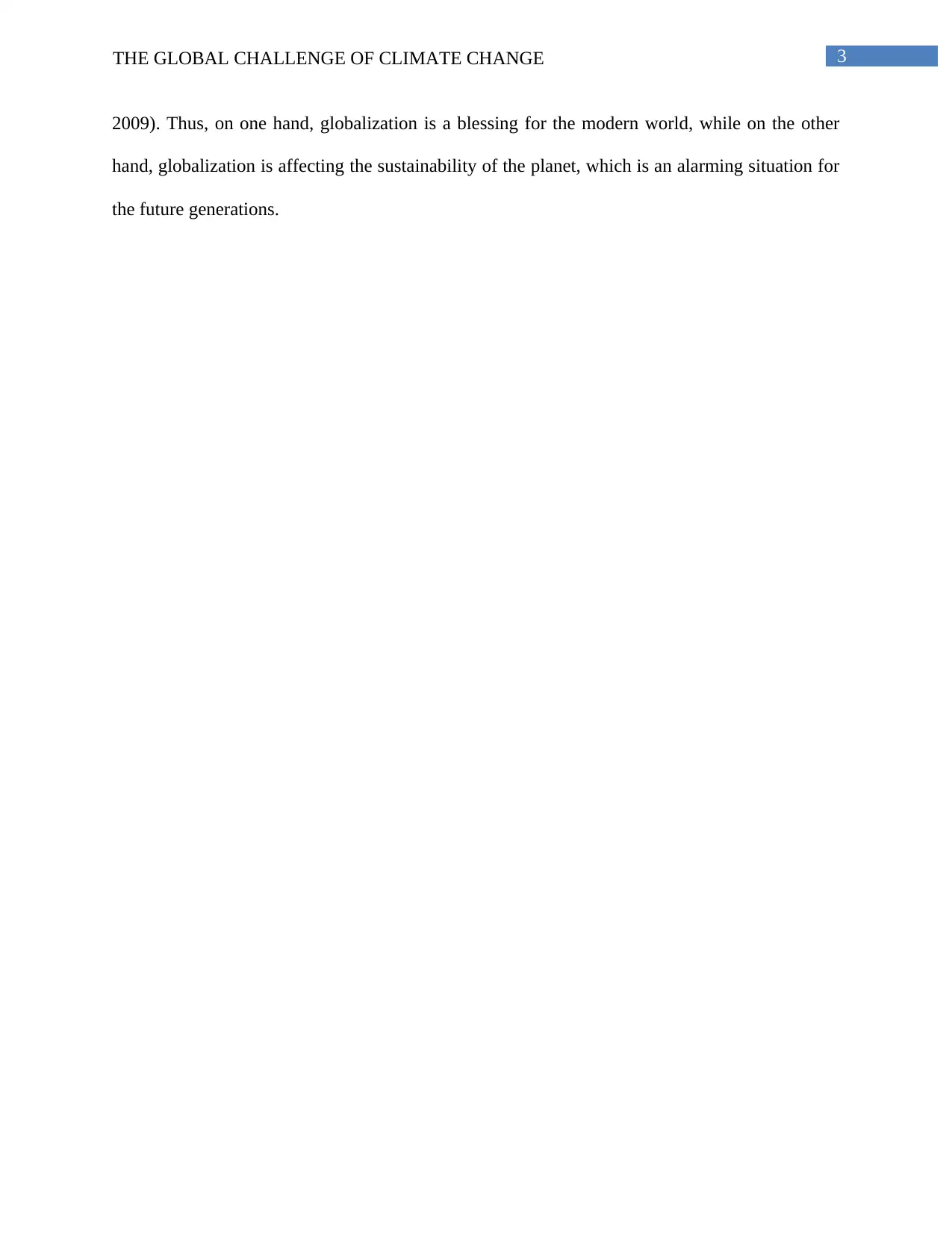
3THE GLOBAL CHALLENGE OF CLIMATE CHANGE
2009). Thus, on one hand, globalization is a blessing for the modern world, while on the other
hand, globalization is affecting the sustainability of the planet, which is an alarming situation for
the future generations.
2009). Thus, on one hand, globalization is a blessing for the modern world, while on the other
hand, globalization is affecting the sustainability of the planet, which is an alarming situation for
the future generations.
Paraphrase This Document
Need a fresh take? Get an instant paraphrase of this document with our AI Paraphraser
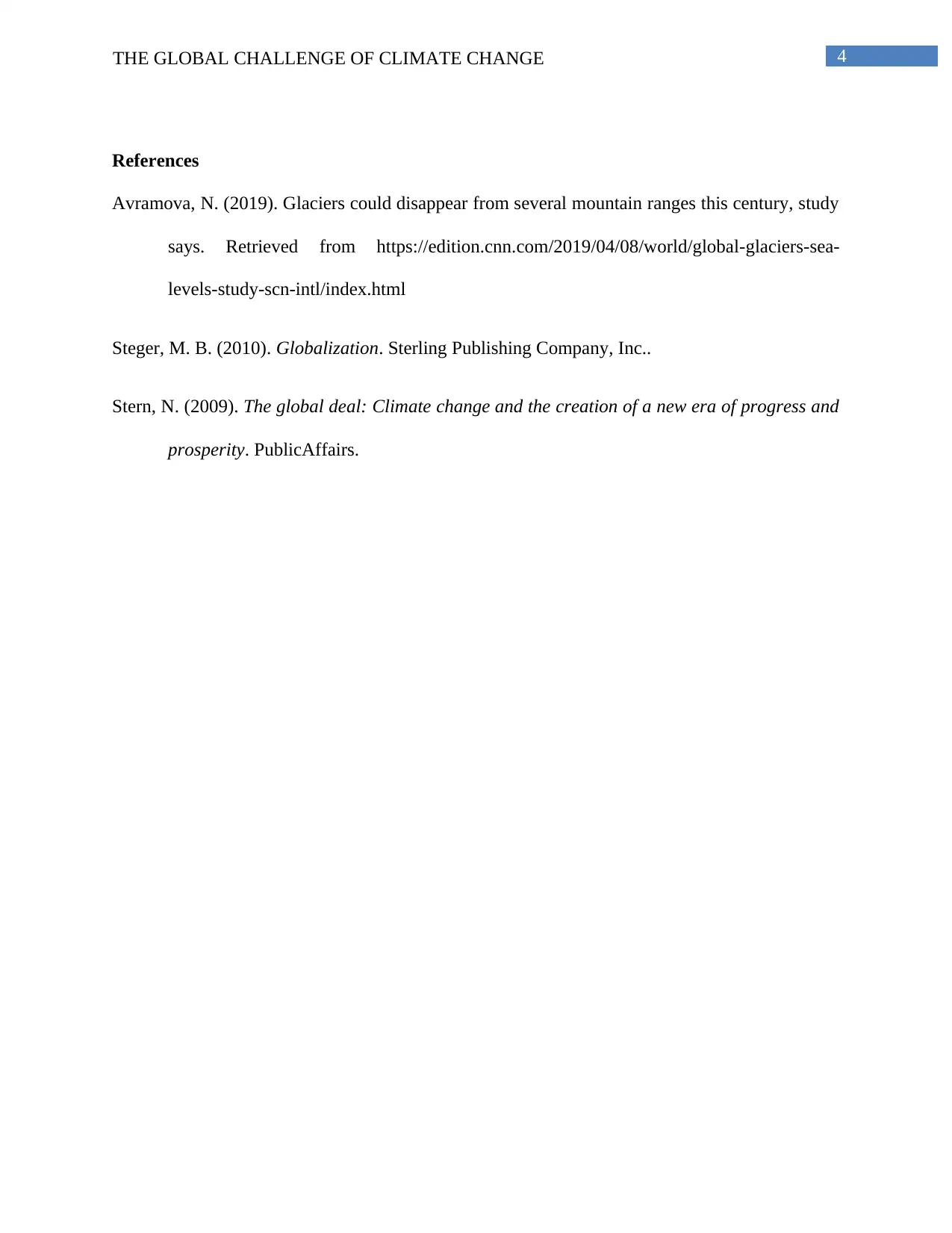
4THE GLOBAL CHALLENGE OF CLIMATE CHANGE
References
Avramova, N. (2019). Glaciers could disappear from several mountain ranges this century, study
says. Retrieved from https://edition.cnn.com/2019/04/08/world/global-glaciers-sea-
levels-study-scn-intl/index.html
Steger, M. B. (2010). Globalization. Sterling Publishing Company, Inc..
Stern, N. (2009). The global deal: Climate change and the creation of a new era of progress and
prosperity. PublicAffairs.
References
Avramova, N. (2019). Glaciers could disappear from several mountain ranges this century, study
says. Retrieved from https://edition.cnn.com/2019/04/08/world/global-glaciers-sea-
levels-study-scn-intl/index.html
Steger, M. B. (2010). Globalization. Sterling Publishing Company, Inc..
Stern, N. (2009). The global deal: Climate change and the creation of a new era of progress and
prosperity. PublicAffairs.
1 out of 5
Related Documents
Your All-in-One AI-Powered Toolkit for Academic Success.
+13062052269
info@desklib.com
Available 24*7 on WhatsApp / Email
![[object Object]](/_next/static/media/star-bottom.7253800d.svg)
Unlock your academic potential
Copyright © 2020–2026 A2Z Services. All Rights Reserved. Developed and managed by ZUCOL.




